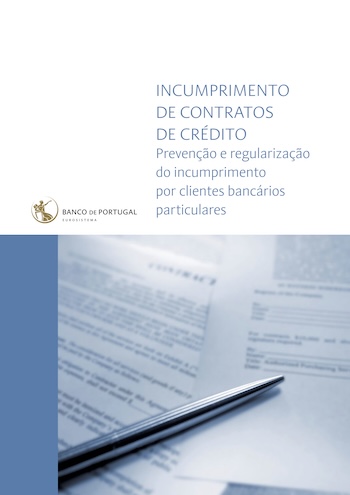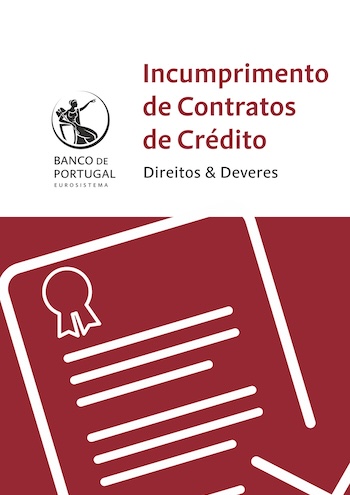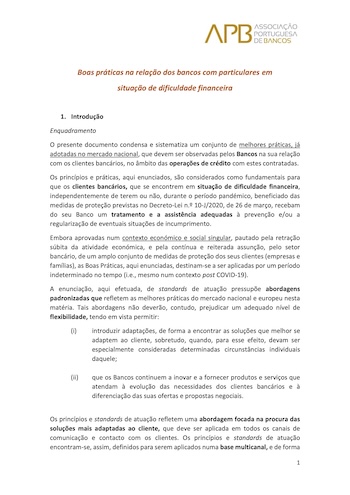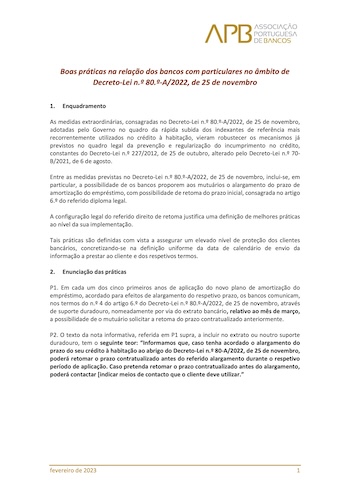Banking Customer
Arrears Prevention and Management
Responsible lending is one of the most important principles of credit institutions' conduct.
In addition to the rules to be followed when granting credit, there are also a number of rules, addressed to credit institutions, relating to:
- Monitoring and managing situations of enforcement of credit agreements entered into with banking customers, with a view to preventing default;
- Settling defaults by consumers who prove to be unable to meet their financial commitments to credit institutions, for a wide range of reasons.
These rules apply to most credit agreements signed with consumers (except financial leasing).
Thus, for the prevention of default, it is expected that credit institutions will draw up Default Risk Action Plans (PARI), to be made available to their employees, which will describe in detail the procedures that, on the one hand, enable the signs of default risk to be detected early and consumers reporting difficulties in meeting the obligations arising from such agreements to be monitored and, on the other hand, promote the swift adoption of measures likely to prevent such default.
In turn, and under the scope of the Out-of-court procedure for default settlement (PERSI), the bank should assess the one-off or lasting nature of the default registered, assess the consumer’s financial capacity and, where feasible, submit settlement proposals appropriate to the consumer’s financial situation, objectives and needs. During the time under the auspices of PERSI, banking customers benefit from a set of rights and guarantees in order to settle default situations, by agreement with the credit institution granting the credit, avoiding recourse to the courts (e.g. the bank is not allowed to terminate the credit agreement on the grounds of default).
Banking customers who are at risk of default or in arrears with their credit payments can obtain information, advice and follow-up free of charge from the entities that form part of the Indebted Consumer Support Network (RACE).
Banco de Portugal publishes on the Banking Customer Portal (Prevention of default / Management of default) fundamental information, legal and regulatory rules applicable to defaults on credit agreements, including guidelines for their application by credit institutions. The information disclosed is backed by a description of the applicable legal scheme, aiming to raise banking customers’ awareness of them.
This subject is also described on the National Financial Training Plan’s Todos Contam Portal, in the content on family budget planning. Information on this subject can also be viewed on the Directorate-General for Consumer Protection Consumer Portal.
Good Practices
In their relationship with banking customers, and within the context of the credit transactions contracted with them, banks are subject to compliance with a set of legal obligations, as well as a set of principles and standards specifically aimed at preventing and managing default.
Also, within this context, banks seek to implement a set of good practices to ensure that customers in financial difficulties receive appropriate treatment and assistance to prevent and/or remedy any default situations.
In 2021, as part of the support measures created to tackle the Covid-19 pandemic, the APB and its members published some general principles and rules of conduct – "Good practices in the relationship between banks and individuals in financial difficulty" – followed by banks in their relationships with customers, as part of the credit operations contracted with them.
In 2023, and within the scope of the entry into force of Decree-Law no. 80-A/2022, which laid down measures to reduce the effects of the increase in interest rates on the mortgage credit agreements, such as a loan repayment term extension, it was considered necessary to define best practices, ensuring a high level of protection for bank customers. These best practices are detailed in the document below. Decree-Law No. 80-A/2022 was in force until December 31, 2023.




